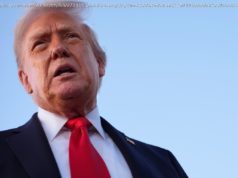Trump’s international debut was like two trips in one, showcasing new rapport with Saudis and Israel but skepticism with longtime Western allies
Donald Trump made no secret during the presidential campaign of his disdain for America’s trading partners, his skepticism of longtime alliances and his eagerness to refocus U. S. foreign policy on the single-minded pursuit of American security.
That was the largely the president the world got as Trump made his way through the Middle East and Western Europe over the last nine days,
Trump’s first foreign trip may have produced memorable, and at time cringe-inducing, images of the new president, whether grasping a glowing orb in Saudi Arabia or shoving the prime minister of Montenegro at a NATO meeting in Brussels. But perhaps most profoundly, the trip underscored what “America First, ” as Trump has branded his governing philosophy, looks like on the world stage.
In Saudi Arabia, Trump reassured Saudi and Egyptian leaders, whom he identified as key partners in fighting terrorism, that he wouldn’ t lecture them about human rights and civil liberties, despite the regimes’ troubled records.
He celebrated a multibillion-dollar arms deal with Saudi Arabia that the White House said would produce American jobs.
In Europe, he harangued NATO leaders for not paying their “fair share” to support the 68-year-old-military alliance and pointedly did not publicly recommit to NATO’s Article V, which requires members to come to the defense of any member state that is attacked.
And Trump took a new swipe at Germany, allegedly telling other European leaders that the country’s trade practices were “bad, ” an account which has been both confirmed and denied by administration officials.
Trump finally left Europe on Saturday without committing to remaining in the Paris climate accord, despite efforts by European leaders to impress on him that pulling out of the agreement would be a major mistake.
The embrace of Middle Eastern autocrats and criticism of longtime European allies has drawn strong criticism from foreign policy leaders of both parties, to say nothing of the reception Trump received in the European media.
“When the United States acts in the world, everybody’s watching us, not just the leaders that we’ re talking to across the table, ” said Jeffrey Prescott, who oversaw matters dealing with Iran, Iraq, Syria and the Persian Gulf states on President Obama ’s National Security Council.
Prescott was particularly critical of Trump’s refusal to raise human rights issues in the Middle East. “For someone who wants to be a deal-maker, it is surprising to see us unilaterally disarm when it comes to expressing support for our values around the world, ” he said. “It’s not clear that we’ re getting anything for that.”
R. Nicholas Burns, who was ambassador to NATO under President George W. Bush and now teaches at Harvard University ’s Kennedy School of government, told CNN that Trump’s NATO visit was the least effective presidential performance in the alliance’s history.
Trump also has made a clear break from his Democratic predecessor, who during his final trip abroad called the U. S. “an indispensable nation in our world order.”
“If we’re not on the side of what’s right, if we’re not making the argument and fighting for it, even if sometimes we’re not able to deliver at 100 percent everywhere, then it collapses, ” President Obama warned last November.
But White House officials repeatedly defended the Trump’s approach, noting the president’s responsibility to protect American interests.
“His basis for a decision is ultimately what is going to be best for the United States, ” National Economic Council director Gary Cohn told reporters Saturday in Italy.
Trump himself underscored the message, telling the Saudis, for example, that America’s first priority “is always the safety and security of our citizens.”
Just before heading home Saturday, Trump drove it home, insisting again that NATO members contribute more to the alliance. “We want to be treated fairly, ” the president said at a rally with U. S. service members at Naval Air Station Sigonella in Italy.
Trump’s emphasis on security and domestic economic concerns largely reflects the priorities of the voters who elected him. And they, arguably, remain his most important audience.
For example, just one in three Americans who are Republican or lean Republican say they believe that free-trade agreements have been good for the U. S., according to a poll last month by the Pew Research Center.
By contrast, two-thirds of Americans who identify as Democrats or who lean Democratic say such agreements have been positive, the poll found.
But despite the president’s rhetoric, the Trump administration has emphasized that the U. S. would not pull back from the world stage.
“To the contrary, prioritizing American interests means strengthening alliances and partnerships that help us extend our influence and approve the security of the American people, ” national security advisor H. R. McMaster told reporters ahead of the trip.
Indeed, in Saudi Arabia, Arab nations signed an agreement to crack down on the financing of terrorism, and U. S. and Saudi officials signed a new economic-investment and arms agreement.
In Israel, Trump paid a culturally and geopolitically significant visit to the Western Wall while privately and publicly prodding Israeli and Palestinian leaders to reignite serious peace discussions.
And for all the focus on the awkward body language between Trump and European leaders, the Group of Seven and NATO summits ended with fresh commitments to enhance mutual efforts to fight terror networks and confront radicalization.
“I think we hit a home run no matter where we were, ” Trump said in Italy before boarding Air Force One to return to Washington.
But as Trump headed home, many in Europe remained concerned about the future of U. S. leadership.
Most immediately, many global leaders are anxiously awaiting the president’s decision about whether to pull out of the landmark Paris accord to combat climate change.
A communique issued at the conclusion of the G-7 summit in Sicily noted that the U. S. “is in the process of reviewing its policies on climate change and on the Paris Agreement, ” but that the other six nations nonetheless reaffirmed their commitment to the deal.






